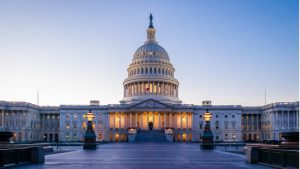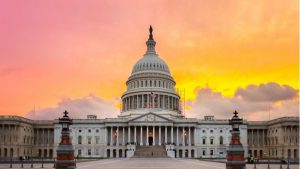States have a big opportunity to provide internet service to millions of unconnected citizens people with billions in broadband funding provided by Congress in bipartisan infrastructure legislation, but states have a lot of work to do to make the most of the funds, according to a McKinsey & Co. report released on June 7.
The Department of Commerce’s National Telecommunications and Information Administration (NTIA) announced that 34 states and territories have officially signed on to participate in the $45 billion “Internet for All” Initiative, NTIA announced.
The White House has released a “Rural Playbook” to help familiarize state, local, tribal, and territorial governments in rural areas with the Infrastructure Investment and Jobs Act, and assist them in applying for funding under the law.
State and local government transportation authorities are experiencing a historic moment of change. After the pandemic decimated revenues for transit and transportation, state and local leaders now have a once-in-a-generation opportunity to invest in transportation, thanks to funding from the $1 trillion Infrastructure Investment and Jobs Act (IIJA).
The Senate on Jan. 11 voted to approve the nomination of Alan Davidson as Assistant Secretary of Commerce for Communications and Information, and head of the agency’s National Telecommunications and Information Administration (NTIA).
The Infrastructure Investment and Jobs Act that President Biden signed last November represented a win for state and local governments (SLG), with the inclusion of a $1 billion cybersecurity grant program targeted at improving SLGs’ cybersecurity posture.
FCC Chairwoman Jessica Rosenworcel – long an advocate for government action to make broadband services more affordable in order to lessen the digital divide in the U.S. – said this week that she welcomes current congressional action to boost funding for broadband benefits but also expressed some skepticism about the effectiveness of service rate discount cuts being contemplated by Congress.
House Speaker Nancy Pelosi, D-Calif., has pledged to schedule a vote on the $1 trillion Infrastructure Investment and Jobs Act by September 27.
Infrastructure week finally arrived in Washington, D.C. with the Senate’s approval of the $1 trillion Infrastructure Investment and Jobs Act on Tuesday morning. The bill – whose main tech-related titles include $65 billion for broadband and around $2 billion for cybersecurity – cleared the Senate by a vote of 69-30.
Following a pair of votes on the Infrastructure Investment and Jobs Act over the weekend, the bipartisan infrastructure measure is nearing the finish line in the Senate. The bill is currently on track for a final vote in the Senate on Tuesday morning.











